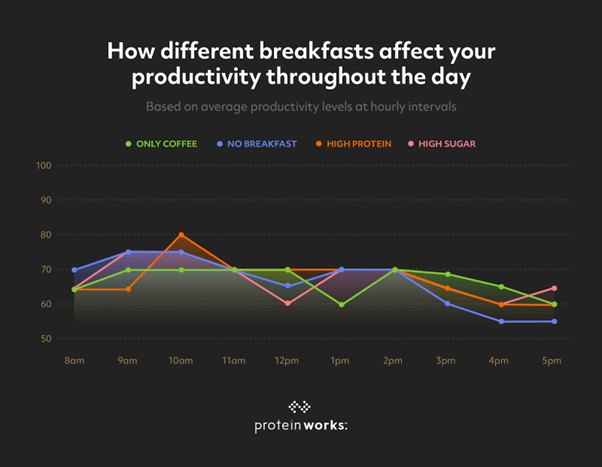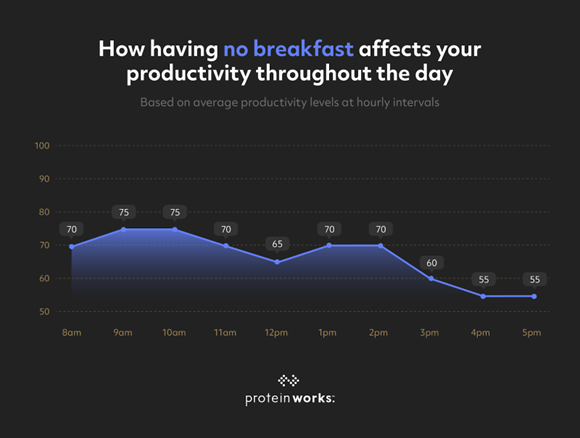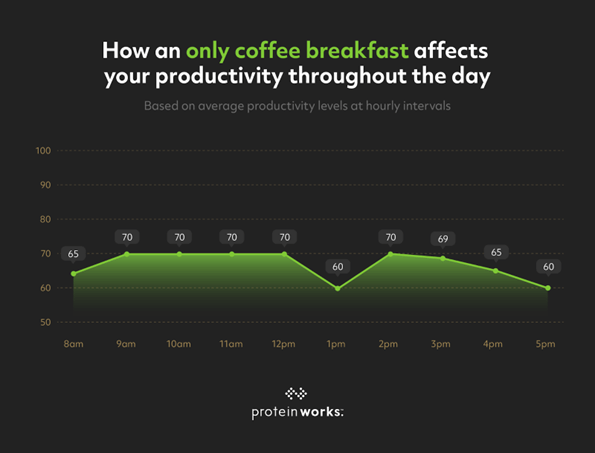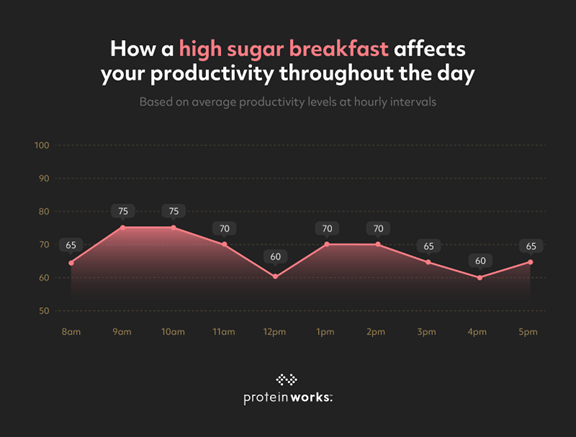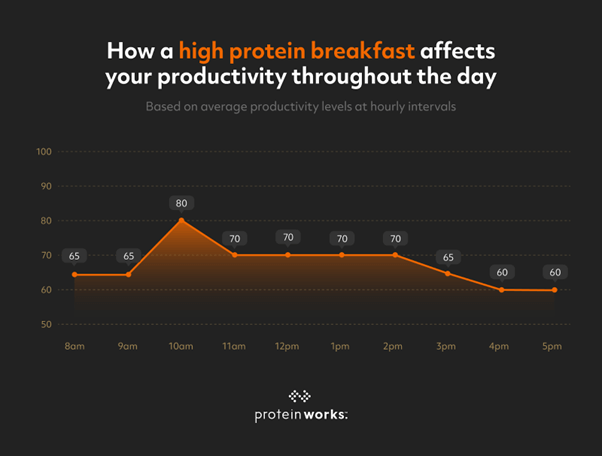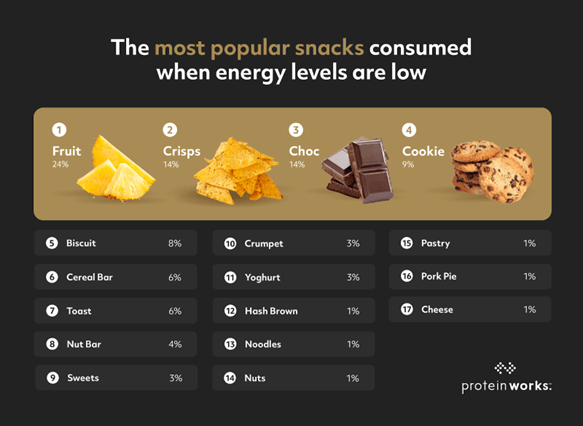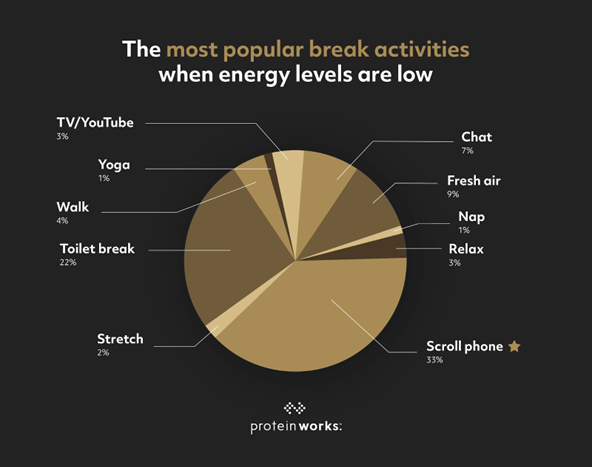
The 3pm Slump: How nutrition can affect your productivity
Everyone has experienced the dreaded afternoon slump at work when their energy levels dip and they start to feel less focused and productive.
Here at Protein Works, we took a closer look into what affects our mid-week slumps, as well as what we turn to when we have them and how to combat them.
Discover our findings on the 3pm Afternoon Slump below…
The Study
A study was conducted to investigate the time of day when people experience the afternoon slump and how nutrition can affect it. We divided 32 participants into four groups and gave them four different breakfast options: high protein, high sugar, only coffee, and no breakfast.
We tracked their productivity levels by the hour for five days to see when they hit their slumps and what foods, drinks, and distractions they turned to the most*.
The Results: How Your Breakfast Affects Your Productivity
Eating No Breakfast Causes The Biggest Afternoon Crash
51% of Brits admit to not eating breakfast everyday. However, the study revealed that people who skipped breakfast saw the biggest afternoon crash in the whole study, declining by 15% from 2pm onwards.
This is due to the fact that the longer a person goes without eating, the quicker their blood sugar levels will spike at their next meal causing a bigger eventual crash – clearly evident in this group’s productivity scores after lunch.
This group also fell victim to a gradual morning dip in productivity between 9 am and 12 pm. This can be linked to glucose being essential metabolic fuel for the brain and without refuelling in the morning, energy levels will continue to deplete causing difficulty concentrating and thus making you gradually less productive as the morning continues.
Only drinking coffee for breakfast leads to lunch time crashes
A third of the UK are ditching the breakfast food for coffee and whilst the study shows an initial burst of energy, increasing productivity levels by 5%, this boost is short lived and has a shelf life of 4-5 hours before an inevitable caffeine crash at mid-day.
Caffeine works by stimulating your nervous system, increasing brain activity and enhancing focus and cognition. However, the stimulating effects of caffeine typically wears off after 4 hours letting fatigue set in – evident in the dramatic decline of productivity at 1pm.
Coffee does, however, have a half-life of 6 hours, meaning half of the caffeine will still be present in your body from 2pm. This could explain why the productivity scores show a more gradual decline in the afternoon as some benefits of the caffeine may still be present.
High sugar breakfasts takes your productivity on a rollercoaster
In such a fast-paced society it’s no wonder 34% of people are opting to eat a quick bowl of cereal or other high-sugar options for breakfast. However, the study revealed this group had the most continuous fluctuations in productivity levels, totalling three peaks appearing after breakfast, lunch and at the end of the day.
After a high sugar breakfast, it’s evident that blood sugar levels spiked causing a large burst of energy and 10% increase of productivity within the hour. However, as a result of this quick energy, insulin will start producing rapidly to help maintain blood glucose levels causing a sudden drop in energy levels, also known as hypoglycaemia – aka a sugar crash.
This is reflected through their productivity scores between 10-12pm. As people try to curb the feelings of tiredness and brain fog, many consume more quick refined sugars and carbohydrates, perpetuating the cycle of highs and lows of dysglycemia replicating a roller coaster of productivity throughout the day.
High protein breakfasts have the highest and steadiest productivity scores
Protein is essential for productivity because it improves cognitive function as it’s full of amino acids helping the brain send important signals, but it also keeps our blood sugar more stable – as seen throughout 10-2pm. This stability is likely due to the fact protein takes longer to digest than carbohydrates, slowly releasing energy and preventing continuous spikes and crashes throughout the day.
High-protein breakfasts caused the highest peak in productivity of the whole study, increasing by 15%. This could be linked to the fact many high protein foods also contain the amino acid tryptophan which creates serotonin (the feel good chemical).
In turn, serotonin has been linked to boost cognitive abilities including memory, focus and learning speed which could explain partly why productivity levels reached their highest at 80 in the whole study.
Findings and Conclusions:
1. The Official Afternoon Slump Hits Exactly At 3pm
They don’t call it the 3pm slump for no reason. The data found that on average, everyone really does hit their slump at exactly 3pm!
Coffee drinkers experienced the quickest mid-day slump, at, followed by the high-sugar breakfast at 3:05pm, no breakfast group at 3:06pm and finally the high-protein group at 3:12pm. This emphasises the fact that protein can help provide more sustained energy throughout the day and postpone the mid-day slump, whilst depleted or increased energy stores from high-sugar of caffeine can cause quicker crashes.
However, when it comes to productivity levels, high-protein breakfasts came out on top with an average score of 67.9, whilst sugar (64.4) and coffee (63.9) came in second and third place followed by no breakfast with a score of 63.2. This highlights that without any sources of energy, productivity is considerably hindered and people should strive to fuel themselves with a balance of energy to boost productivity in a sustained way.
2. Tuesday is the new hump day, seeing people go on their phone 30% more than Friday
Tuesday has been named the least productive day of the week, coming out with a median productivity of score of 63, followed by Thursday (65), Monday and Wednesday (66) then Friday (67).
The study revealed that Tuesday’s phone usage during work was at its highest, at 1 hour and 33 minutes, whilst on Fridays it was found to be at its lowest, at 1 hour and 3 minutes per day – both of which correlates to the findings that people are more distracted on Tuesdays and more focused on Fridays.
The study also found that during the beginning of the week, people hit their slump earlier, especially on Monday which hit at 14:23pm – 37 mins earlier than average. Followed by Tuesday (14:55pm), Wednesday (15:05pm), Friday (15:06pm) and Thursday (15:30pm).
3. People Reached For High Sugar Food And Their Phones During Their Afternoon Slump
The study found that high sugar snacks such as fruit, chocolate and biscuits were the most consumed throughout the day. These were mostly commonly reached between 11am to 12pm and again at 3pm to 4pm. Whilst some people reached for a pre-lunch snack, most opted for a post lunch snack in order to overcome their slump.
People were most likely to go on their phones during their slump, with 35% of people scrolling content to break up their day. The second most common activity was understandably toilet breaks, making up 22% followed by getting fresh air at 9%.
Again, there was an influx in these activities specifically between 3-4pm, however, these aren’t always the best ways to combat the 3pm slump…
How’s Best To Combat The 3PM Slump?
What is evident from the data is that nutrition can really affect what time of the day your productivity will deplete and can determine how many peaks and troughs you go through in a working day.
Drawing on findings from the data, nutritionist Kyle Crowley explains how to incorporate these findings to help combat the 3pm slump:
“What is evident from the study is that consuming any sort of energy in the morning, whether that be sugar, coffee or high protein is always better than skipping breakfast, as that will only lead to a greater crash in the afternoon. When possible, consuming a high-protein breakfast will provide the biggest benefits, seeing the biggest peak in productivity as well as the most stable and consistent focus throughout the day.
“But like always, it’s all about moderation and making nutrition work for you. Everyone enjoys a breakfast pastry but there can be smarter ways to implement them into your weekly routine. It’s evident in the study that peoples average productivity levels are lower and hit quicker on Mondays and Tuesdays so perhaps focus on more protein-fuelled breakfasts early on in the week and save the sweet treat or coffee run for Friday instead.
“Likewise, swapping the cookies and chocolate snacks for natural sugars like fruit, will help give you that much needed afternoon pick up. Even better would be to consume a more filling and stabilising source of protein like nuts around 1pm prior to the slump to help prevent the feelings of fatigue rather than solve.
Methodology
We divided 32 participants, who were 9-5pm office workers, into four groups and gave them four different breakfast options: high protein, high sugar, only coffee, and no breakfast. We tracked their productivity levels by the hour for five days to see when they hit their slumps and what foods, drinks, and distractions they turned to the most.
After the study, each participant’s logs were collected and analysed to draw out the following conclusions. Productivity scores were also found using the median to remove outliers/anomalies in the data.
*Disclaimer: Other factors may have contributed to people’s productivity. By taking the median of each productivity rating we aimed to get an overview of how each group differed. However, this is only a small sample size based on office workers working 9-5pm therefore the results only show a generic overview of peoples productivity patterns on a very small scale but is reflective of the peaks and troughs of productivity.
Additional Data Sources
https://www.ncbi.nlm.nih.gov/pmc/articles/PMC5445139/
https://yougov.co.uk/topics/society/survey-results/daily/2023/01/06/1ddfa/3


